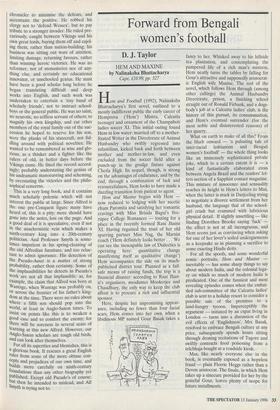Forward from Bengali women's football
D. J. Taylor
HEM AND MAXINE by Nalinaksha Bhattacharya Cape, £10.99, pp. 327 Hem and Football (1992), Nalinaksha Bhattacharya's first novel, outlined to a mostly indifferent public the early career of Hemprova (`Hem') Mintra, Calcutta teenager and ornament of the Champaboti ladies soccer XI. This initial outing found Hem in low water: married off to a mother- fixated Writer in the Directorate of Animal Husbandry who swiftly regressed into infantilism, kicked back and forth between mother and mother-in-law, and even excluded from the soccer field after a punch-up in the grudge fixture against Chetla High. Its sequel, though, is strong on the advantages of endurance, and by the end, through a combination of luck and resourcefulness, Hem looks to have made a dazzling transition from patient to agent. Hem and Maxine begins with Hem now reduced to lodging with her ascetic chum Paromita and satisfying her romantic cravings with Miss Brinda Bagui's five- rupee College Romances — touting for a place in the recently formed Rani Jhansi XI. Having regained the trust of her old sparring partner Miss Nag, the Marxist coach (`liem definitely looks better . . . We can see the inescapable law of Dialectics is operating here: quantitative change manifesting itself as qualitative change') Hem accompanies the side on its much- publicised district tour. Planned as a fail- safe means of raising funds, the trip is a financial disaster: according to Rani Jhan- si's organisers, mesdames Mookerjee and Chaudhury, the only way to keep the club afloat is to procure a rich and influential sponsor.
Here, despite her unpromising appear- ance, including no fewer than four facial scars, Hem comes into her own, when a libidinous MP named Gour Basak takes a fancy to her. Whisked away to his hillside tea plantation, and contemplating the pampered life of a rich man's mistress, Hem neatly turns the tables by falling for Gour's attractive and supposedly aristocrat- ic English wife Maxine. The rest of the novel, which follows Hem through (among other callings) the Animal Husbandry Directorate, prison, a finishing school straight out of Ronald Firbank, and a dogs- body's job at a Calcutta ladies' club, is the history of this pursuit, its consummation, and Hem's eventual surrender (for the most noble and disinterested reasons) of her quarry.
What on earth to make of all this? From the blurb onward — 'a pulsating tale of inter-racial lesbianism and Bengali women's football' — the whole thing looks like an immensely sophisticated private joke, which to a certain extent it is — a kind of fantastically elaborated cross between Angela Brazil and the readers' let- ters section of a Sapphist contact magazine. This mixture of innocence and sensuality reaches its height in Hem's letters to Max, when the latter is stuck in Darjeeling trying to negotiate a divorce settlement from her husband, the language that of the school- girl crush but crammed with lubricious physical detail. If slightly unsettling — like finding Dorothea Brooke saying 'fuck' the effect is not at all incongruous, and Hem seems just as convincing when asking for one of her lover's soiled undergarments as a keepsake as in planning a sacrifice to some exacting Hindu deity.
For all the spoofs, and some wonderful comic portraits, Hem and Maxine inevitably — has some sharp things to say about modern India, and the colonial lega- cy on which so much of modern India is predicated. One of the funniest and most revealing episodes comes when the embat- tled sub-committee of the Calcutta ladies' club is sent to a holiday resort to consider a possible sale of the premises to a land-hungry tycoon. Imperceptibly the argument — initiated by an expat living in London — turns into a discussion of the evil effects of 'Englishness'. Mrs Basak, resolved to embrace Bengali culture at any price, subsequently spends hours sitting through droning recitations of Tagore and swiftly contracts food poisoning from a telebhaja bought at a roadside kiosk.
Max, like nearly everyone else in the book, is eventually exposed as a hopeless fraud — plain Florrie Heggs rather than a Devon aristocrat. The finale, in which Hem takes up a sinecure provided for her by the grateful Gour, leaves plenty of scope for future installments.






































 Previous page
Previous page